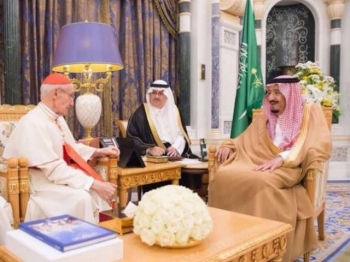The example and legacy of Cardinal Jean-Louis Tauran, Knight Grand Cross of the Order
 Meeting of Cardinal Jean-Louis Tauran with King Salman of Saudi Arabia, last April in Ryad (Photo: Royal Embassy of Saudi Arabia in Italy).
Meeting of Cardinal Jean-Louis Tauran with King Salman of Saudi Arabia, last April in Ryad (Photo: Royal Embassy of Saudi Arabia in Italy).
We wish to pay tribute to a great man of the Church, a member of the Order of the Holy Sepulchre, who courageously bore the burden of his disease, working tirelessly for the advent of the Kingdom of God. Passed away on July 5, 2018, he left a mark in history both for his commitment to service of universal fraternity and for his testimony as a humble disciple of Christ.
One thing is certain: the dedication and commitment of Cardinal Jean- Louis Tauran have not gone unnoticed in these years in which we have seen him carry on his duties as Camerlengo of the Holy Roman Church and president of the Pontifical Council for Interreligious Dialogue with strength and passion despite the illness left him increasingly frail in body.
We cannot but recall the evident emotion with which he announced the election of Jorge Mario Bergoglio on March 13, 2013. Pope Francis himself on July 12 at the funeral did not just want to preside over the final rite of the “ultima commendatio” and “valedictio” – as per protocol for the deceased cardinals – but wanted to be present throughout the whole celebration, joining in profound prayer with the church full of friends, collaborators, faithful of various religious traditions who came to pay a final tribute to this man of dialogue.
Born in Bordeaux in 1943, he was ordained a priest in 1969. Six years later he entered the diplomatic service of the Holy See, holding various positions in various nations. Knight Grand Cross of the Order of the Holy Sepulchre since 1992, when he held the role of Secretary for Relations with States of the Holy See, Cardinal Tauran has always worked to support peace and a culture of encounter. It was St. John Paul II who first appointed him titular Archbishop of Telepte in 1990, granting him the fullness of the order in 1991, and then elevating him to the dignity of cardinal in 2003. The late Cardinal followed in the footsteps of Pope John Paul II in offering himself and his energies in a body that fought against disease until the end.
We recall that in April, only three months before his death, Cardinal Tauran did not want to renounce his mission in Riyadh, a visit that represented an important step, as it was the first time that Saudi Arabia welcomed a head of the dicastery of the Holy See. In the meeting with Muhammad Abdul Karim Al-Issa, secretary of the World Muslim League, Tauran dealt with burning issues such as religious extremism, terrorism, freedom of faith and the possibility of building places of worship where there are religious communities that need them and full citizenship for all beyond religious differences.
Let us recall some of his words of his last important public intervention: "We believe that what the terrorists want to show is that it is not possible to live together. We believe the exact opposite! We must avoid aggression, ignorance and denigration of other religions. Religious pluralism is an invitation to reflect on faith, because every true interreligious dialogue begins with the proclamation of each one’s faith. We do not say that all faiths are equal, but that all believers, all those who seek God and all people of good will without any religious affiliation, have equal dignity. Every person must be left free to embrace the religion they prefer. What threatens us all is not the clash of civilizations, but the clash of ignorance and radicalism."
Msgr. Miguel Ángel Ayuso Guixot, secretary of the Pontifical Council for Interreligious Dialogue, remembers him with these words: “a gentleman, a priest, a zealous pastor to all, a brother to each of us. I never heard a complaint from him. Affable, courteous, always endowed with a great humor, a humble person”. And he concluded by underlining how Cardinal Tauran was first and foremost “a person who believed in humanity” as evidenced by the last book he penned, which was just published, Je crois en l’homme: les religions font partie de la solution, pas du problème [I believe in man: religions are part of the solution, not of the problem].
Cardinal Tauran died in a year in which various great figures of dialogue have disappeared. This leaves on the shoulders of those who, like the Order of the Holy Sepulchre, operate in a context of religious diversity, in which the culture of the encounter sustained by Pope Francis is a real thrust of life, the responsibility of carrying forward his example and follow his teaching.
Elena Dini
(Summer 2018)



